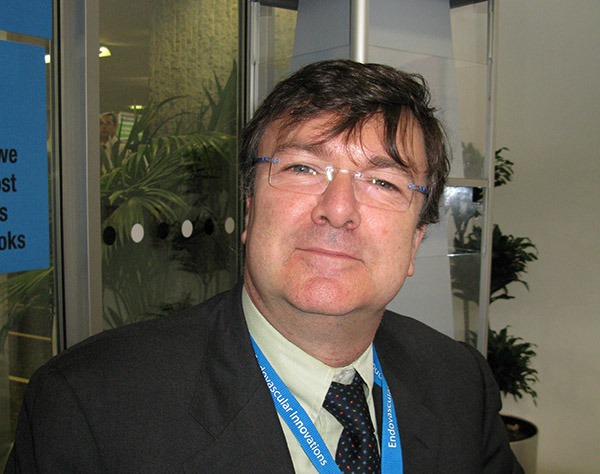
Paolo Zamboni, Ferrara, Italy, the proponent of the chronic cerebrospinal venous insufficiency (CCSVI) theory, and his colleagues have reported that the randomised, double-blinded, sham controlled Brave Dreams trial has not demonstrated a benefit for venous angioplasty in the treatment of patients with multiple sclerosis (MS).
Zamboni, presented the results of the Brave Dreams trial at VeithSymposium (14–18 November, New York, USA). The results were also simultaneously published online ahead of print in JAMA Neurology on 18 November.
Chronic cerebrospinal venous insufficiency (CCSVI) is a term that describes compromised flow of blood in the veins draining the central nervous system. According to Zamboni, it is characterised by restricted venous outflow from the brain and spinal cord. “Whether this condition is associated with MS and whether venous percutaneous transluminal angioplasty is beneficial in persons with MS and CCSVI is controversial,” the authors write in JAMA Neurology.
Many MS patients and advocacy groups are disillusioned by the influence of drug companies in their medical treatment regimens and have became passionate torchbearers of CCSVI and venous angioplasty after it was first proposed in 2009. The rapid spread of information regarding the scientifically unproven condition, CCSVI, and also angioplasty as a proposed treatment option via the internet resulted in patients travelling afar to receive this treatment, much before it was rigorously tested. Recent well-designed randomised controlled trials have not shown a benefit for venous angioplasty for MS patients.
As reported in JAMA Neurology, Zamboni and colleagues noted that in the Brave Dreams trial, which included 115 patients with relapsing-remitting multiple sclerosis, venous angioplasty did not increase the proportion of patients who improved functionally nor did it reduce the mean number of new combined brain lesions on magnetic resonance imaging at 12 months. The team further reported that there was a tendency for more patients to become free of new lesions after venous angioplasty, mainly because of a reduction in new lesions appearing six to 12 months after randomisation. These findings led them to conclude that venous angioplasty cannot be recommended for patients with relapsing-remitting multiple sclerosis.
The trial was carried out in six MS centres in Italy from 2012 to 2016. Patients were randomly allocated (2:1) to either venous angioplasty or catheter venography without venous angioplasty, which was the sham arm and the findings analysed on an intention-to-treat basis.
The two primary endpoints assessed at 12 months were: a composite functional measure (ie, walking control, balance, manual dexterity, postvoid residual urine volume, and visual acuity) and a measure of new combined brain lesions on magnetic resonance imaging, including the proportion of lesion-free patients. Combined lesions included T1 gadolinium-enhancing lesions plus new or enlarged T2 lesions.
The authors concluded: “Venous angioplasty has proven to be a safe but largely ineffective technique; the treatment cannot be recommended in patients with MS.”









For a moment I thought prof. Gamboni earned my admiration for a brave man. After 8 years of deluding MS patients (and credulous physicians) all over the world at last Gamboni himself appears to have settled CCSVI as a non-existing disease. However, not entirely so since he found it fit to state that there appeared a tendency for more patients to become free of new lesions after venous angioplasty, mainly because of a reduction in new lesions appearing six to 12 months after randomisation. So, the delusion will go on. Therefore I I think we owe him for this study but no admiration.